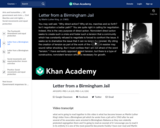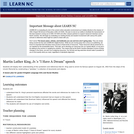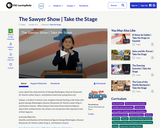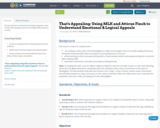
A close reading of Martin Luther King, Jr.'s "Letter from a Birmingham Jail."
- Subject:
- Political Science
- Social Science
- Material Type:
- Lesson
- Provider:
- Khan Academy
- Provider Set:
- Khan Academy
- Author:
- Sal Khan
- Date Added:
- 07/16/2021

A close reading of Martin Luther King, Jr.'s "Letter from a Birmingham Jail."

This course explores the history of the ideal of personal freedom with an eye towards contemporary debates over the pros and cons of the regulatory state. The first part of the course surveys the sociological and theological sources of the concepts of freedom and civil society, and introduces liberty’s leading relatives or competitors: property, equality, community, and republicanism. The second part consists of a series of case studies in the rise of modern liberty and libertarianism: the abolition of slavery, the struggle for religious freedom, and the twentieth-century American civil liberties movement. In the last part of the course, we take up debates over the role of libertarianism vs. the regulatory state in a variety of contexts: counter-terrorism, health care, the financial markets, and the Internet.

Students will display their understanding of the symbolism and references that Dr. King used to enrich his famous speech on August 28, 1963 from the steps of the Lincoln Memorial by constructing a "jackdaw," a collection of documents and objects.

This is a PowerPoint for beginning to intermediate level ESOL students with worksheets and activities including suggestions for a reader's theater activity of the Montgomery Bus Boycott.

This course addresses the philosophical question of what a non-violent life entails. It investigates its ethical dimensions and challenges, and considers whether we can derive a comprehensive moral theory from the principle of non-violence. In addition, it discusses the issues of lying, the duty to forgive, non-violent communication, the ethics of our relationship to anger, the possibility of loving enemies, and the ethics of punishment and rehabilitation. Readings are included from primary exponents of non-violence, such as Tolstoy, Gandhi, and King.
This course is part of the Experimental Study Group at MIT.

Learn about the achievements of George Washington, Eleanor Roosevelt, Dr. Martin Luther King Jr., and Dolores Huerta by acting them out!
Sawyer, a student in history class, imagines himself hosting a talk show with guests George Washington, Eleanor Roosevelt, Dr. Martin Luther King Jr., and Dolores Huerta. When Sawyer interviews these historical figures about their achievements, the viewers act out phrases that represent each of their legacies.
Learning Objective:
Identify contributions of the historical figures George Washington, Eleanor Roosevelt, Dr. Martin Luther King Jr., and Dolores Huerta.

An introduction to emotional and logical appeals, using To Kill a Mockingbird and the Civil Rights Movement as context.